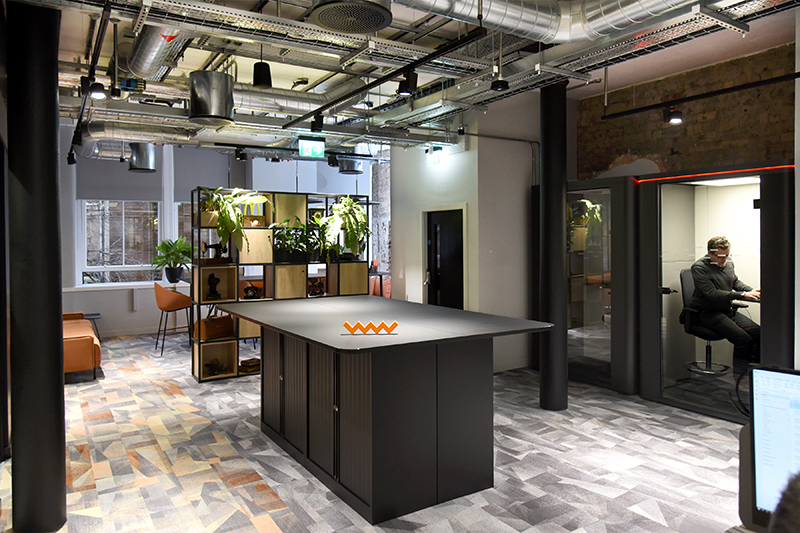
REPLICATING the quality service, customer trust, and market dominance of Apple is what Wallace Whittle is working towards, chiefs at the high-flying environmental building services firm have told Project Scotland amid continued investment in its operations.
Fresh off completing landmark projects including Edinburgh’s St James Quarter and the Barclays Glasgow campus and wider Buchanan Wharf development in the city, the business is currently providing MEP design and sustainability consultancy services on various new build and refurbishment projects including the first net zero hospital in Scotland.
The company is also behind the design of MEP and infrastructure for the proposed £2 billion 205-acre West Town community in Edinburgh, and the SFT LEIP Energy Band A Neilston Learning Campus.
Further examples of the firm’s work can be found in the highly energy efficient design of Glasgow’s Radisson Red hotel, and at Scottish Power’s nearby HQ, where Wallace Whittle designed the environmental building services engineering for the base build and also a Cat B fit-out.
Despite the impressive portfolio of projects and repeat business sitting at around 80%, continued investment has been made by the new ownership team, led by MD Allan McGill, since the management buyout of the now 60-year-old firm in 2021 – with the one-time apprentice at the company saying they are ‘hell-bent’ on delivering the best service to clients, which all begins with the wellbeing of staff.

“The key thing is keeping morale high because, by default, our clients benefit because, fundamentally, they get a better service and quality of product,” Allan explained, after welcoming Project Scotland into the company’s modernised HQ in the revamped Garment Factory in Glasgow city centre.
“That’s what every client wants; they just want an easy life, and our job is to give them that easy life.
“We’re trying to develop our company to be market-leading; we want to be the Apple or Dyson of the MEP and engineering world.”
Key to this are the office facilities and benefits provided to staff including private healthcare, school leavers earning to learn being paid 40% above the real living wage, a salary sacrifice scheme that gives staff access to electric vehicles at discounted prices, a staff shop where employees have an allowance to spend on branded clothing and accessories, and maternity and paternity leave being ‘well beyond’ the statutory minimum.

“The whole culture is to attract the best people, look after them, help them to be the best that they can be, and keep them long-term,” Allan explained. “The world has changed. Covid has fast-tracked the evolution of staff and staff expectation levels, so we think we’re ahead of the curve by giving staff above average, to say the least, environments to work in – we’re giving them market-leading benefits.”
As well as the Glasgow HQ, Wallace Whittle has premises in Aberdeen, Edinburgh, London, Warrington, and Belfast.
The Aberdeen and Edinburgh offices feature fittings that mimic the brickwork of the 19th century Garment Factory. The same technology that regulates airflow, temperature, and CO2 levels feature in each office, as do the same coffee machines, complementary refreshment fridges, break-out areas, private workspaces, and social areas. The only differentiator is the bespoke backwall art, which pays homage to each city’s landmarks – albeit, in the same art style.

The office’s hot desk set up means no one has a set desk, leading to those of all disciplines and levels finding themselves sat together and interacting. Lunches can also only be eaten in the social spaces, in a bid to further push socialising amongst staff – with a bespoke mood-boosting music playlist played in sync at all offices.
“If you think back to the origins of offices, merchants, lawyers, and accountants used to work from their houses and then they started to get together and collaborate in coffee houses in London in the 1600s,” Stephen Osborne, director at the firm, stated. “This is kind of like working in a coffee shop – you’ve got music, the good coffee, the social space, different places to sit.”
Despite widely reported skills shortages engulfing the construction sector, Wallace Whittle has grown substantially in recent years, increasing headcount from 90 to 135 since the 2021 buyout.

“In a market driven by expensive recruitment consultants we’re very attractive to staff – we get people knocking on the door and saying ‘can I join you’,” Stephen added.
The year ahead is set to be an ‘interesting’ one for the company. As well as the ongoing major projects across various sectors, the other standout projects for 2024 include the provision of MEP and sustainability consultancy services on the £100 million build of the Ruby Hotel on Edinburgh’s Princes Street, and various large scale higher education accommodation blocks.
The diversity of work leaves the business well prepared to withstand some of the challenges facing construction at the moment, including both economic and political uncertainty.
“We’re operating in every sector – hotels, residential, student residential, BTR, co-living, leisure, sports, industrial,” Stephen concluded. “And that helps us ride the storm – we’re widely diversified.”








